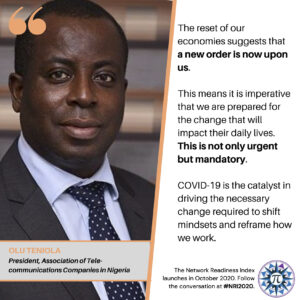This is part of our Dialogue on Digital Transformation series, in advance of the upcoming 2020 Network Readiness Index.
Olu Teniola is the National President of the Association of Telecommunications Companies of Nigeria and also serves as the Alliance for Affordable Internet’s national coordinator for Nigeria. With over 25 years’ experience in the telecommunications industry, Olu(OT) has worked across both the technical and commercial levels of digital transformation.

COVID-19 has acutely impacted the need for digital transformation. In which ways has the pandemic kickstarted digital transformation in the telecommunications sector?
Olu(OT): There have been many impacts to the current way we do business – in particular the idea of virtual meetings and Working From Home (WFH) as the new norm. This adoption of new ways of operating our businesses has caused an uptake in retooling, reskilling and reconfiguring the work environment and putting internet connectivity in the forefront of decision making.
What could enable firms, governments and individuals to survive and even thrive during this crisis?
Olu(OT): Awareness is a primary element that has begun to shape the discussions around how collaborative online tools can reduce costs: both in terms of wasted time in traffic and travel time to a specific location for face-to-face meetings. Building up knowledge in social behaviour online has been another primary element alongside re-enforcement of new norms in utilising technology to improve efficiencies in processes and procedures
On the flip side: does every organization need to be digitally transformed in order to stay competitive or just survive?
Olu(OT): It is our belief that most organisations need to be digitally transformed with immediate effect to remain competitive… whilst others, that have more complex interconnections and interactions, can be phased in over a period of time measured in years! COVID-19 highlighted many outdated modes of operating and configuring a business and also revealed opportunities to innovate and adopt change management initiatives to overcome the restrictions that COVDI-19 brought into the equation.
What has the telecommunications sector learned from the first wave of COVID-19 that they could apply to surviving and thriving during the second wave?
Olu(OT): The unpredictability of the spread of the virus created reliance on data and systems that could make or add meaning to the information that drove management decision making. So the first wave taught us that tele-working works for a limited period of time for certain categories of functions and job roles and secondly that managing diverse teams remotely is a challenge for Organisations that are very hierarchically based. Finally, we have also realised that the changes required in addition to the adoption of technology is the need to address the Digital Literacy deficiency.
Moving to the issue of inclusion, diversity and the Digital Divide. How could digital transformation be leveraged to rebuild more inclusive, diverse and equitable economies and workplaces in the post-COVID world?
Olu(OT): With an increase in the number of STEM related courses and STEM based jobs, it is easier for digital transformation to occur. There is also a generational aspect to the manner and way productivity will be realised amongst younger generations, hence with all activity or at least a high percentage of new jobs being involved in online activity the ability to afford and have access to tools, applications and devices across this demographic is critical to an equitable economic society. Reskilling of the current workforce may take a significant amount of time (measured in years rather than months) to create the transition from legacy based working behaviour to a “Work of the Future” setting.
So how could digital transformation help fight unemployment?
Olu(OT): In the case of Africa, a majority of meaningful internet connectivity to online communities is from the urban cities and not from the rural areas, which often comprises the majority of the population. This is where the infrastructure gaps exist. WFH in urban cities could create Small-Office-Home-Office (SoHo) opportunities amongst artisans joining the World Wide Web for the first time, as they transition from cash-dependent to a cashless mode of operation. However, a majority of post-COVID-19 jobs will be in the building of the optic fiber networks, community networks and other IT infrastructure that will be required to facilitate the WFH from the rural areas of Africa.
What leadership and culture is needed to ensure that this won’t exacerbate the digital divide? And how should firms and governments build a supportive ecosystem for this digital leadership?
Olu(OT): A coalition leadership approach, including all stakeholders, will assist in ensuring the needs and requirements of the weakest in the society are met! Inter-/intra-forum and collaborative dialogue that addresses the complex interplay across cultural and ethical situ is critical to the stakeholder engagement that will be required to achieve the outcomes in order to support a sustainable ecosystem. Governments should adopt digitalization in the way it replaces old out-of-date “legacy systems”. This leadership should then transcend into the private sector in an enabling environment – supported by regulations that protects the consumers.
Finally, what is the role of reskilling, upskilling and lifelong learning in becoming a future-ready firm, government or society?
Olu(OT): In my humble opinion, the role of reskilling is critical to the ability of each citizen to be able to participate in contributing in a productive way in the Digital Age. Cybersecurity and data protection are also skills that must play a role in ensuring that each citizen is protected against the vulnerability of the Internet.
And how urgently should firm leaders across industries be reskilling themselves and their staff?
Olu(OT): The reset of our economies suggests that a new order is now upon us. This means it is imperative that – with adoption of new technologies – workers, staff, consumers and communities are prepared for the change that will impact their daily lives. This is not only urgent but mandatory. COVID-19 is the catalyst in driving the necessary change required to shift mindsets and reframe how we work – and ultimately prepare us for the Fourth Industrial Revolution.



